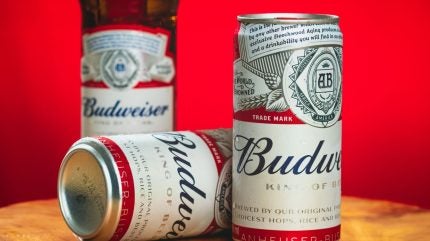
Shares in Anheuser-Busch InBev tumbled today (31 July) after the world’s largest brewer reported falling sales in Brazil and China.
AB InBev’s share price was down 11.56% today as of 16:39 BST.

Discover B2B Marketing That Performs
Combine business intelligence and editorial excellence to reach engaged professionals across 36 leading media platforms.
Revenue in Brazil dipped 1.9% during the Leffe brewer’s second quarter. Volumes dropped 6.5%, attributed to “underperforming a soft industry, which was primarily impacted by adverse weather”.
In its first half, AB InBev saw revenues drop 1.5% in Brazil year on year while volumes slid 2.4%.
Second-quarter volumes for the group’s overall South America business declined 4.9% to 34 million hectolitres. In the half year, volumes dipped 1.6% to 75 million hectolitres.
In a note to clients, Bernstein analyst Trevor Stirling described Brazil as “the pain point” for AB InBev in the second quarter.

US Tariffs are shifting - will you react or anticipate?
Don’t let policy changes catch you off guard. Stay proactive with real-time data and expert analysis.
By GlobalDataOn a call with analysts, CEO Michel Doukeris said: “During the second quarter, we made strategic revenue management choices to position the business well for the second half of the year.”
In China, AB InBev’s volumes declined 7.4% in the second quarter. The business said it saw “continued weakness in our key regions and channels”. However, revenue per hectolitre increased 1.7%.
Revenue was down 9.4% in the region in the first half while volumes dropped 8.2%.
AB InBev also booked volume declines in its wider Asia Pacific market, with total volumes down 6.6% in the second quarter to 23.7 million hectolitres. In the first half, these dropped 6.4% to 43.4 million hectolitres.
Reflecting on China with analysts, Doukeris said the industry was seeing a “slowdown” but that was not anything “new”.
He added: “Of course, the size of the underperformance now is much smaller relative to what we saw last year.
“And we continue to think that as we move through the quarters, we’ll see this impact reducing the comps, becoming more in favor of the industry, and at one point, this industry should start a fire on the right direction but not there yet on quarter two.”
The Stella Artois brewer continued to see slower sales in China in its second quarter in the on-trade, a problem which the group also highlighted in May. At the time, the company said it planned to focus on off-trade in efforts to boost its performance in the market.
“The own trade is not rebounding,” Doukeris told analysts today. “The growth that we see in the industry is more in the off premise. So a big portion of our plans in China now are improving the route to market, improving the propositions that we have for the off-premise.
“The good part is that we under-index in share the off-premise, so there is a lot of space for us to capture and to grow, but it demands adjustments on the execution.”
Speaking to analysts in May, Doukeris said he had expected to see a “normalising of the industry” in China by the “summer, back end of the year”.
Meanwhile in the US, the group saw slightly more positive figures. Revenue in the second quarter was up 2.1%, attributed to “revenue management initiatives and premiumisation”, AB InBev said. In its first half, however, revenues were down 1.5%.
Total volumes in North America were flat in the second quarter, growing 0.3% to 22.4 million hectolitres. In the first half, they were down 3% at 42.2 million hectolitres.
Overall, AB InBev saw its group revenue in its second quarter rise 3% on an organic basis to $15bn. In its first half, revenue grew 2.3% organically to $28.6bn.
Total volumes were down 1.9% in the second quarter and declined 2% in the first-half.
Normalised EBIT in the quarter increased 10.2% organically to $4bn and by 10.3% in the first half to $7.6bn.
Underlying profit grew reached $1.9bn in the second quarter, up from $1.8bn, and increased from $3.3bn to $3.6bn in its first-half.
Analysts at RBC Capital Markets lowered their organic volume growth forecast for AB InBev in 2025 following the results from -0.7% to -1.3% in light of “what was an unimpressive Q2 performance”, it said.
They also cut its organic sales growth expectation for the group to 3.4% in 2027 from 4%.
“The big question is whether this is a business in long term volume decline (-1.4% in 2024 and -1.3% in 2025) or will this prove to be an aberration,” the analysts said.
They added that they thought it would likely be “the latter”, but noted “another quarter of volume decline doesn’t make the argument any easier to sustain”.





